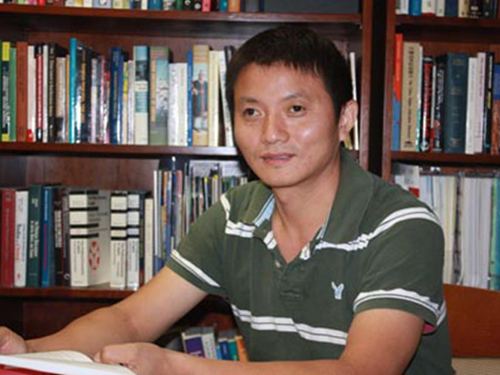蔡華儉,湖北黃梅縣人,1989 年考入華東師範大學心理學繫心理學專業, 1993 年獲學士學位、 1996 年獲基礎心理學專業心理統計與測量方向碩士學位、 2002 年獲基礎心理學專業實驗心理學方向 博士學位。曾擔任上海教育學院、華東師範大學心理學系助教及講師職務。2003年-2009年,先後在西雅圖華盛頓大學心理系( 2003-2005年Tony (Anthony G.) Greenwald 教授實驗室攻讀博士後)、加州大學戴維斯分校心理學系、俄克拉荷馬大學中美關係研究所從事研究工作(期間2005-2008兼職中山大學副研究員)。2010年2月入選中國科學院‘百人計畫’,任職研究員、博士生導師。
基本介紹
- 中文名: 蔡華儉
- 性別:男
- 職稱: 研究員 博士生導師
- 學歷: 博士
人物經歷,研究方向,主要貢獻,獲獎記錄,
人物經歷
1989 年考入華東師範大學心理學繫心理學專業, 1993 年獲學士學位、 1996 年獲基礎心理學專業心理統計與測量方向碩士學位、 2002 年獲基礎心理學專業實驗心理學方向 博士學位。曾擔任上海教育學院、華東師範大學心理學系助教及講師職務。2003年-2009年,先後在西雅圖華盛頓大學心理系( 2003-2005年Tony (Anthony G.) Greenwald 教授實驗室攻讀博士後)、加州大學戴維斯分校心理學系、俄克拉荷馬大學中美關係研究所從事研究工作(期間2005-2008兼職中山大學副研究員)。2010年2月入選中國科學院‘百人計畫’,任職研究員、博士生導師。
社會任職
目前是美國心理學聯合會(American Psychology Association, APA),美國心理學會(American Psychology Society, APS),美國人格與社會心理學會(Society of Personality and Social Psychology, PSPB),國際自我和認同協會(International Society for Self and Identity,ISSI)會員。
研究方向
內隱社會認知:內隱自尊、態度、偏見等及其測量;內隱社會認知的文化差異及起源。
文化與自我:自尊的文化差異及其含義;謙虛與自我評價;中國文化下的自尊的功能及維護。
研究方法:項目反應理論(IRT)及其套用;內隱聯繫測驗效應的認知干擾;心理測驗中的測量不變性;網路測驗特性研究。
工業與組織心理:傳統自陳式測量在人力資源與人才測評中的套用,包括:心理類型量表(MBTI)在人才測評中的套用,人格測量在人才測評中的套用;內隱測量在企業人力資源管理中的套用。
市場與消費心理:內隱、外顯品牌、產品態度與購買行為的關係;名牌消費與自尊、自戀。
主要貢獻
代表論著
Song, H. & Cai, H.*, Brown, J. D. Grimm, K. (2010). Detecting and Evaluating Differential Item Functioning of the Rosenberg Self-Esteem Scale in the U.S. and China: Measurement Bias Matters. Asian Journal of Social Psychology. In press.
Cai, H., Sedikedis, C., Gaertner, L., & Wang, C. (2010). Modesty at the Service of Self-Enhancement: Empirical Evidence from China. Social and Personality Psychological Science. In press.
Cai, H., Fang, X., Yang, Z., & Song, H., & Gries, P. (2010). Implicit animosity: an initial validation. Journal of Social Issues . In press.
Gries, P. H., Crowson, H. M., & Sandel, T., Cai, H. (2010). The Olympic effect on American attitude towards China: Beyond personality, ideology, and media exposure. Journal of Contemporary China. In press.
Gries, P. H., Zhang, Q., Crowson, H.M. & Cai, H. (2010). Patriotism, Nationalism, and China’s U.S. Policy: Structures and Consequences of Chinese National Identity. China Quarterly. In press.
Levinson,J.D., Cai, H.*, Young, D. (2010). Guilty by implicit racial bias: the guilty/not guilty Impicit Association Test. Ohio State Journal of Criminal Law. In press.
Gaertner, L., Sedikides, C., Cai, H. & Brown, J. D.. It’s Not WEIRD, It’s WRONG: When Researchers Overlook uNdelrying Genotypes They will not Detect Universal Processes (Commentary on Henrich, Heine, & Norenzayan).(2010) Behavioral and Brain Sciences. 33,33-34。doi:10.1017/S0140525X10000105.
Cai, H., Deng, C., Zhou, L., Zhao, G. (2010). An Investigation of AIDS-related Knowledge and Reactions among College Students in China. Acta Psychologica Sinica. 41(11), 518-527. DOI: 10.3724/SP.J.1041.2010.00518.
Brown, J.D. & Cai, H. (2010). Self-Esteem and Trait Importance Moderate Cultural Differences in Self-Evaluations. Journal of Cross-Cultural Psychology, 41(1),116-123.
Kim,Y., Chiu, C-Y, Peng, S., Cai, H., Tov, W.(2010). Is Positive Self-Regard Grounded Only to People from Euro-American Cultures?: Interplay of Motivation and Culture. Journal of Cross-Cultural Psychology. 41(1), 62-75.
Brown, J.D & Cai, H. (2009). Thinking and Feeling in the People’s Republic of China: Testing the Generality of the ‘Laws of Emotion’. International Journal of Psychology, 1464-066X.
Nosek, B. A., Smyth, F. L., Sriram, N., Lindner, N. M., Devos, T., Ayala, A., Bar-Anan, Y., Bergh, R., Cai, H., Gonsalkorale, K., Kesebir, S., Maliszewski, N., Neto, F., Olli, E., Park, J., Schnabel, K., Shiomura, K., Tulbure, B., Wiers, R. W., Somogyi, M., Akrami, N., Ekehammar, B., Vianello, M., Banaji, M. R., & Greenwald, A. G. (2009). National differences in gender-science stereotypes predict national sex differences in science and math achievement. Proceedings of the National Academy of Sciences, 106, 10593-10597.
Cai, H., Wu, Q., & Brown, J. D. (2009). Is Self-Esteem a Universal Need? Evidence from The People’s Republic of China. Asian Journal of Social Psychology, 12, 104–120.
Brown, J.D, Cai, H., Oakes, M., & Deng, C. (2009). Cultural Similarities in Self-Esteem Functioning: East is East and West is West, But Sometimes the Twain Do Meet. Journal of Cross-Cultural Psychology, 40 (1), 140-157.
Oakes, M. Brown, J.D, & Cai, H. (2008). Implicit Self-Esteem: Measure for Measure. Social cognition, 26(6), 778-790.
Cai, H., Brown, J.D., Deng, C., & Oakes, M., (2007). Self-esteem and culture: Differences in cognitive self-evaluations or affective self-regard? Asian Journal of Social Psychology, 10,162-170.
Yamaguchi, S., Greenwald, A.G., Banaji, M.R., Murakami, F., Chen, D., Shiomura, K., Kobayashi, C., Cai, H., & Krendl, A. (2007). Apparent universality of positive implicit self-esteem. Psychological Science, 18(6), 6-8.
Cai, H., Sriram, N., Greenwald, A.G., & McFarland, S.G. (2004). The Implicit Association Test’s D measure can minimize a cognitive skill confound: Comment on McFarland and Crouch. Social Cognition, 22(6), 673-684.
蔡華儉,黃玄鳳,宋海榮。性別角色和主觀幸福感的關係:基於中國大學生的檢驗。心理學報,2008, 40(4),474-486。
蔡華儉,林永佳,伍秋萍,嚴樂,黃玄鳳。網路測驗和紙筆測驗的測量不變性研究:以生活滿意度量表為例。心理學報,2008, 40(2): 228-239 。
蔡華儉,伍秋萍,鄧賜平。對由不同途徑感染的愛滋病患者的區別性反應及中介分析。心理學報,2008, 40(1):54-63。
蔡華儉。泛文化的自尊----基於中國大學生的研究證據。心理學報, 2006,38(6),902-909。
符起俊,伍秋萍,蔡華儉。中學生創造性內隱觀的調查研究。套用心理學,2005, 11(3),265-270。
蔡華儉。 對Greenwald提出的內隱聯繫測驗的介紹,心理科學進展,2003, 11(3),339-344。
蔡華儉。內隱自尊效應及其和外顯自尊的關係,心理學報,2003, 35(6),796-801。
蔡華儉。內隱自尊的穩定性:成敗操縱隊內隱自尊的影響,心理科學,2003, 35(6), 461-464。
蔡華儉。外顯自尊,內隱自尊和抑鬱,中國心理衛生,2003, 17(5), 331-336.
蔡華儉,朱臻文。心理類型量表修訂步,套用心理學,2002,7(2),33-37。
蔡華儉,李鵑。信號檢測論範式下的心理旋轉研究,心理科學,2002, 25(4),479-481。
楊治良,蔡華儉,符起俊,大學生創造性內隱觀的調查研究-----關於高創造性者的特徵。心理科學,2002,25(1),641-645。
蔡華儉,楊治良。大學生性別自我概念的結構,心理學報,2002,34(2), 168-174。
蔡華儉,符起俊,桑標,許靜。創造公眾觀的調查研究(I)-----關於高創造性者的特徵,心理科學,2001,24(1),46-50。
蔡華儉,符起俊。 創造公眾觀的調查研究(II)-----關於影響創造性的因素,心理科學,2001,24(4),432-435。
蔡華儉,周穎,史青海。內隱聯繫測驗在性別刻板印象研究中的套用,社會心理研究,2001,11(4), 6-11。
蔡華儉,陳權。心理學旋轉能力的發展及其與智力的相關性。心理科學,2000, 23(3),363-365。
蔡華儉,楊治良。對三維心理旋轉任務操作特性的效應的研究,1998, 21(2),153-158。
蔡華儉。計算機化自適應測驗,心理學探新,1996,16(3), 52-56。
科研項目
曾主持上海市社科類重點基金項目一項,日本住友集團海外研究基金一項。
獲獎記錄
2001年曾獲國家級教學成果二等獎。

